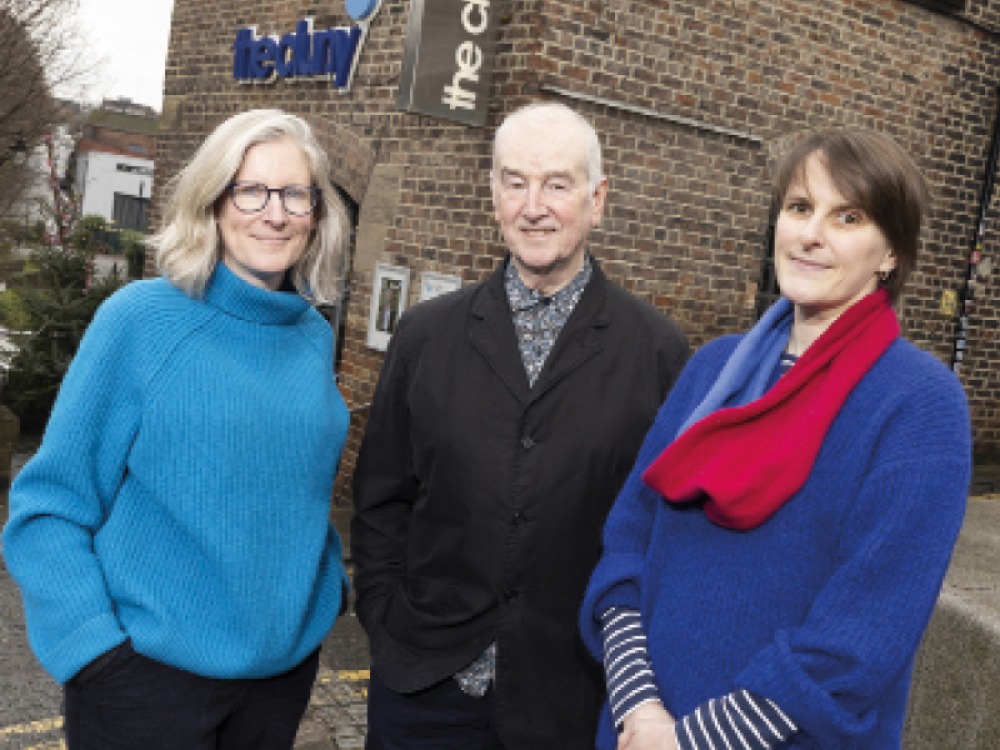This Theatre Adaptation of David Almond's A Song For Ella Grey Will Premier in Newcastle

A new adaptation of David Almond's award-winning novel A Song for Ella Grey will premiere at Northern Stage in February
With a dad from the North East and a mum from the North West, Esther was born in Manchester but moved to Redcar aged three, then moved to Durham to be closer to her dad’s family. ‘The landscapes of the North East were my entire childhood,’ she tells us. ‘Going up to Northumberland (which is what the kids do in A Song for Ella Grey) was a classic trip for me with my family and friends. Throughout my life, I’ve always returned there. I think because of growing up by the sea in Redcar (although it seems like a cliché because we all have it), I’ve always had a deep connection to the coast. I’m an open water swimmer now, at all times of the year, and our coastal landscapes are still really important to me.’
While Esther was growing up there weren’t many opportunities to see theatre in the North East, but that all began to change when she started St Leonard’s Catholic School in Durham. ‘I had some fantastic English teachers, and they ignited in me a love of words and literature, and that extended to theatre,’ she says. ‘In our later teens, they’d take us on theatre trips and at that time the RSC had a big residency in Newcastle so we were really lucky that as school kids we got to see some amazing productions with people like Emma Thompson (in A Midsummer Night’s Dream at Newcastle Theatre Royal) – that was pretty amazing!’
Esther admits it was likely that production that demonstrated the power of storytelling to her. ‘It made me feel like something I wanted to pursue, but that felt like a complete pipe dream,’ she adds. ‘How do I do that as a state school kid from Durham? Actually, everyone thought I’d be a really great teacher. I wanted to apply to study theatre at university but everyone talked me out of it, thinking I wouldn’t get in to do it because I’d never studied drama. So I chose English Literature because I knew I’d be able to study Shakespeare – and might be able to do a bit of theatre.’
Esther went to University of Bristol, drawn in by their drama department. ‘A lot of students there, like me, were really curious about theatre and putting plays on so suddenly it didn’t matter as much that Drama wasn’t my degree. I got into student theatre and that’s how I started out.
‘How I ended up directing was that no one else wanted to do it,’ Esther laughs. ‘Everyone wanted to do the acting – what they saw as the fun bit! It suddenly emerged that I had some leadership skills. People kept saying I was good at it, and I thought maybe I was, but it took a long time to become a professional theatre director after that. How you get into theatre is just having a go at it. It’s a Marmite activity, and you understand very quickly if you like it or you don’t. There’s a lot of complexity and stress in terms of putting a play on, and there’s a lot to do.’
After university Esther spent a year as a a TEFL teacher in Poland. ‘I was in Warsaw and on the first weekend I met a group of Americans who had an amateur theatre society and I threw my lot in with them, putting on amateur productions. My mum and dad came out to see me and for the first time they realised this is what I really wanted to do. That was a turning point, because I felt like I then had their support.’
Esther got a big break with the Royal Shakespeare Company in London as an Assistant Dramaturg. ‘Because I’d done English, and got The Shakespeare Prize at Bristol, that turned into a bit of a super power because I was confident with text and scripts,’ she explains. ‘Eventually I realised that I actually really did want to be a theatre director but it was challenging being from the North East, not being from huge wealth, and being a woman as well. It wasn’t like I had anyone similar to look up to, because almost all theatre directors were men, and quite often they were a lot older than me. Society was different then. I decided to, in the end, go freelance which meant I had time and capacity to make my own work too. With a bit more of a reputation, I got a job running Pilot Theatre which also meant I could be a lot closer to home. I feel I’ve achieved my dream now, I’ve just had to go on a bit of a journey to achieve it.’
Read More: Meet the Yorkshire Actress Swapping the Cobbles for the Dales

Esther is artistic director and joint chief executive at Pilot Theatre, an international touring theatre company based in York. They specialise in making shows for young audiences, so A Song for Ella Grey is perfect for them. ‘The book is written by David Almond who is a genius writer for children and young people,’ explains Esther. ‘He was working on a different book and whilst in a library in Newcastle a book fell off a shelf and into his lap and it was a book about the Orpheus myths – that’s what he told me. So he felt that this story came to him. A Song for Ella Grey is based on the Orpheus and Eurydice Greek myth. Orpheus is madly in love with Eurydice, but she dies, and he can’t get over that. He’s an amazing musician and he decides to go into the underworld to talk to death to negotiate for Eurydice to be able to come back to the land of the living, because it’s just so cruel that she died so young and they weren’t able to be together. He does persuade death to let her come out but they make a pact – Eurydice can come back to life and out of the underworld only if they make a slow journey through a tunnel to the land of the living without Orpheus ever turning back to look at Eurydice. They make the journey and the inevitable happens – just as they’re about to step out, Eurydice touches Orpheus on the shoulder, and he turns back to look at her – and, of course, she vanishes. That’s the myth.
‘What David’s done in his book is told that story from the perspective of a group of Newcastle teenagers. It’s a totally timeless tale and he’s done it so beautifully that if you read the book, you absolutely believe it’s now, but in a way you could be 14, 30 or 50, and you’ll feel like he’s writing about you and your time as a teenager. It’s really clever. Eurydice becomes Ella Grey. It’s about loss and yearning for the person who’s gone. But David has created a third character called Claire – she’s the main protagonist and Ella was her best friend. It’s Claire who introduces Orpheus to Ella, so she feels like everything’s her fault because she feels like she set all of these events in motion. It’s a really lyrical story, really poetic, about love and loss – and I think it’s really timely to tell it now because of the past few crazy years we lived in the pandemic. We’ve all got our own stories about things we never got the chance to do.’
Read More: How a New Documentary is Paying Tribute to Trailblazing Photographer Tish Murtha

Produced by Pilot Theatre, in association with Northern Stage and York Theatre Royal, Zoe Cooper’s adaptation is a contemporary retelling of the Orpheus myth set in the North East and directed by Esther. Following an open casting call for young actors from the North East and Cumbria, there’s a cast of five, including TikTok performer Grace Long. Ella, Claire and their friends fall in and out of love, play music and dance, yearn for excitement, hang out at the Cluny and have parties on the beaches of Northumberland. But when they meet a musician called Orpheus they’re all entranced, especially Ella – and meeting Orpheus changes their lives forever. ‘Primarily this is a story for teenagers, there will be secondary-aged school children at many of our performances, but it’s actually a show for everyone in that sense. What Zoe’s done in the adaptation is really focused on the teens as the storytellers. In the book it’s mainly told from Claire’s perspective, and that’s true on stage, but there are a couple of other characters who support her in telling that. They have to tell the story to set themselves free. It’s really special and there’s live music too. We’re all really excited, the cast is terrific, and it’s a real homecoming project with there being such a strong North East team involved.’











